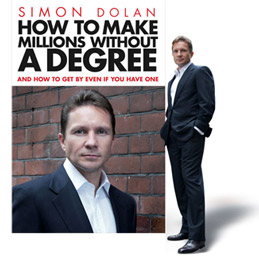Should I go to University?
Going to University used to be a big decision, however more recently it’s become most students default option. But could going to University do more harm than good?
"I feel University only prepares students for a very specific set of circumstances. I’m not sure if it robs them of life skills, but it certainly delays the point at which they attain those life skills. By life skills, I mean work skills, be that in an office or in a factory or whatever – the key is that work skills can only be learned through real work. These are skills that you don't learn from a book you learn them by getting out there and doing them." - Simon Dolan
Nearly 1 in 11 graduates are still unemployed six months after leaving university – the highest proportion for 17 years, according to a 2011 poll by the Higher Education Careers Services Unit charity 2011 figures. Any person considering University should ask themselves...
- How much does it cost to go to University?
- When will I have to start paying my fee's back?
- What is the average salary I will receive as a graduate?
- Do I need a degree?
- What jobs could I potentially get without a Degree?
Due to the introduction of the ‘fee cap’, UK Universities will see tuition fees increase from £6,000 up to £9,000 as of 2012, according to the Office for Fair Access – OFFA. With this in mind it is worth considering alternative options such as work experience, internship, trainee position or even temping, the resources online, in books are endless. Even contacting successful entrepreneurs or business men or women for guidance and advice is a useful resource.
Experience is fast becoming more valuable than that of a University Degree, with drive and determination key for people getting that all important job. 99% of all companies in the UK are small to medium sizes businesses, according to a 2011 survey held by consultants the Centre for Enterprise found – 9-10 employers in the UK recently testified to the fact that they hire according to skills and experience, not on merit of a University degree.
We are not denying that some job’s make it essential for a degree, such as Doctor, Dentist, Nurse, and Lawyer positions, and in these type of positions the degree fee’s are nothing compared the rewards you can reap in being successful within these sectors, however with so many students going to University studying in generic subjects such as Media, Literature and IT, many will graduate seeing their peers, that have been working over the last few years potentially in managerial positions. 57% of employers say that a high proportion of apprentices move into management positions within their company, whilst apprentices can also earn £100,000 more over their working life than other employees, according to Skill Base Apprentice, the dedicated apprenticeship provider.
Some examples of ridiculous courses on offer to students from institutions in the UK are . . .
Staffordshire University - Football Culture
University of Wales - Aromatherapy
Welsh College of Horticulture - Equine Psychology
University of Glamorgan - Fiction and Culture
Marjon College, Plymouth - Outdoor Adventure with Philosophy
Plymouth University - Surf Science
Swansea Institute - Stained Glass Window Studies
"Given the cost and the issue of graduate unemployment, young people are being forced to question the value of a degree", explains Spencer Mehlmann, Managing Director of notgoingtouni.co.uk.
Some other names that are successful entrepreneurs, millionaires and billionaires, who did not continue with further education, include Simon Cowell, Bill Gates, Walt Disney, Ralph Lauren and Coco Chanel to name just a few.
So, is it really worth parting with up to £30k for a degree?

Quotes from the Book
"Luck is preparation multiplied by opportunity"
"..there's a good reason millionaires
don't detail their rise from thousands
to millions. It's because the story is
boring. Businesses grow little by little,
year by year...most millionaires grow
their fortune bit by bit."
Or Kindle version at:


